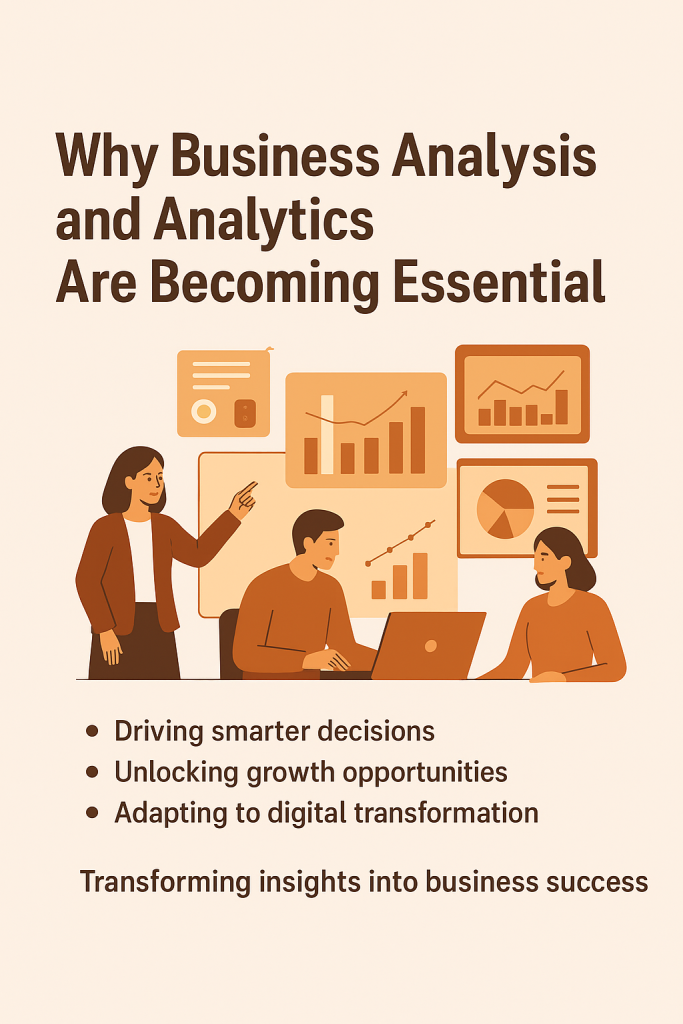In today’s fast-changing business environment, one truth stands out: decisions backed by data outperform those based on guesswork. Organizations across industries are no longer satisfied with “gut feeling” or trial-and-error approaches. Instead, they rely on data-driven decision making to improve efficiency, reduce risks, and uncover growth opportunities.
But here’s the challenge: data is everywhere — scattered across spreadsheets, customer systems, social media, and digital platforms. Making sense of this data, turning it into actionable insights, and aligning those insights with business goals requires a special skill set. This is where business analysis and analytics training step in.
Today, taking a course in business analysis or analytics is no longer just an option for specialists; it’s becoming essential for professionals in every industry. Let’s explore why.
- Why Data-Driven Decision Making Matters
Think about this: companies that use data effectively are 23 times more likely to acquire customers and 19 times more likely to be profitable, according to a McKinsey study.
When leaders have accurate insights at their fingertips, they can:
Launch products customers actually want.
Predict trends instead of reacting late.
Allocate resources more efficiently.
Reduce costs while maximizing returns.
For example, instead of guessing which product feature customers value most, a company can analyze user behavior, feedback, and trends to prioritize the right features. This saves time, money, and positions the business ahead of competition.
This shift explains why organizations are looking for data-savvy professionals who can interpret numbers and connect them to real business outcomes.
- The Rising Role of Business Analysts
Business Analysts (BAs) are often called the “bridge” between business needs and technical solutions. Their role has expanded in recent years, especially in Agile and digital-first environments.
Why? Because companies now need more than just data — they need clarity. A good Business Analyst knows how to:
Gather the right requirements.
Interpret complex data into plain insights.
Guide teams on what really matters for business success.
Without a skilled BA, organizations risk building solutions that don’t solve actual business problems. That’s wasted effort, wasted money, and missed opportunities.
This explains why business analysis courses are seeing huge demand. They train professionals to not just understand data, but to apply it in a way that creates real value.
- Analytics Training – The Competitive Edge
Data by itself is raw. Analytics turns it into meaning. From dashboards to predictive models, analytics skills allow professionals to:
Spot patterns hidden in numbers.
Forecast future outcomes.
Make smarter, faster, evidence-based decisions.
For example, retail companies use analytics to predict customer buying behavior. Banks use it to detect fraud. Hospitals use it to improve patient outcomes. In each case, analytics drives better decisions and better results.
By learning analytics, professionals gain a future-proof skillset. Courses in data analytics, business intelligence, or visualization tools give learners hands-on exposure to tools like Excel, SQL, Power BI, Tableau, and even AI-powered platforms.
And in a digital economy, that competitive edge makes all the difference.
- Why Courses Are Becoming Essential
Let’s be clear — self-learning is valuable, but structured courses offer three powerful advantages:
Practical, hands-on training – Not just theory, but real-world projects.
Industry relevance – Courses are designed to match current business needs, from Agile practices to digital transformation.
Credibility – Having a recognized certification boosts your profile, giving recruiters and employers confidence in your abilities.
Employers want professionals who can prove their skills. Completing a business analysis course or analytics certification signals to the market that you’re prepared to handle complex challenges.
This is why more professionals — from fresh graduates to experienced managers — are enrolling. The demand for data-driven problem solvers is only increasing.
- The Career Advantage
Let’s talk numbers. Roles such as Business Analysts, Data Analysts, and Analytics Consultants are among the fastest-growing jobs globally. LinkedIn’s Jobs on the Rise Report consistently lists these roles in the top 10. Salaries are also on the rise because organizations are willing to pay for the skills that directly impact business outcomes.
By mastering business analysis and analytics, you are not just learning tools — you are building the ability to influence strategy, lead projects, and add measurable value to your organization. That’s a career advantage no one can ignore.
Conclusion
The future of work is clear: businesses that rely on data will thrive; those that don’t will fall behind. And professionals who can harness that data through business analysis and analytics skills will always be in demand.
If you’ve been considering whether to invest in yourself with a course in business analysis or analytics, the answer is simple: now is the time.
Because in a world overflowing with information, the ability to turn data into decisions isn’t just an advantage — it’s essential.
✅ Ready to take your skills to the next level?
Enroll today and transform your career with ScrumConsult’s professional training programs. From Scrum Master Certification to Agile Expert, Project Management, Business Analysis, Lean Six-Sigma Green & Black Belt, SMC, PSM, and CSM, we provide the tools and knowledge you need to thrive in a data-driven world.
📌 Visit scrumconsult.com today to get started.

